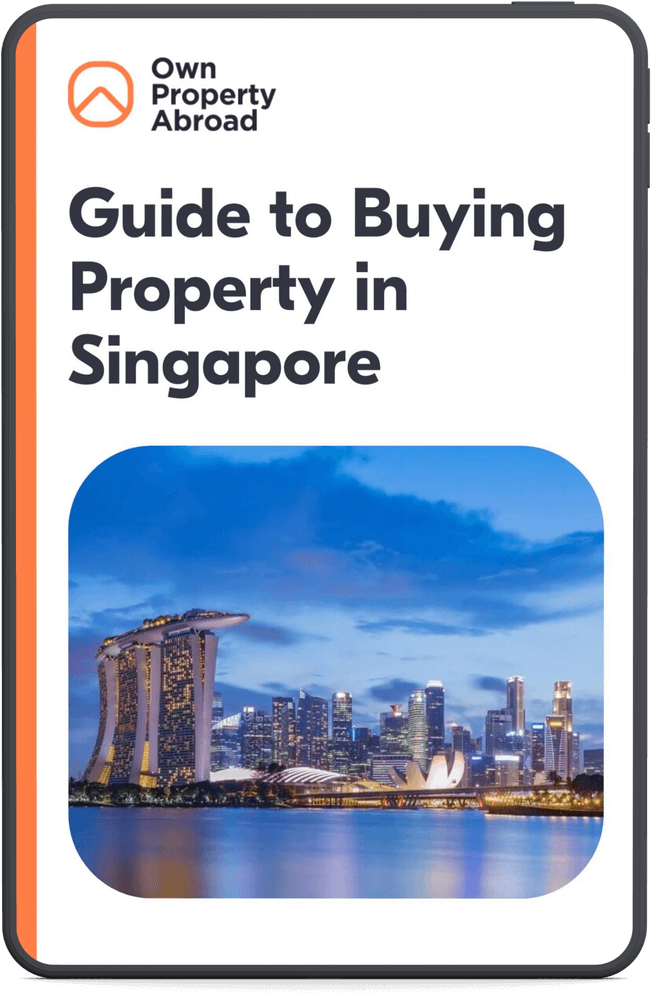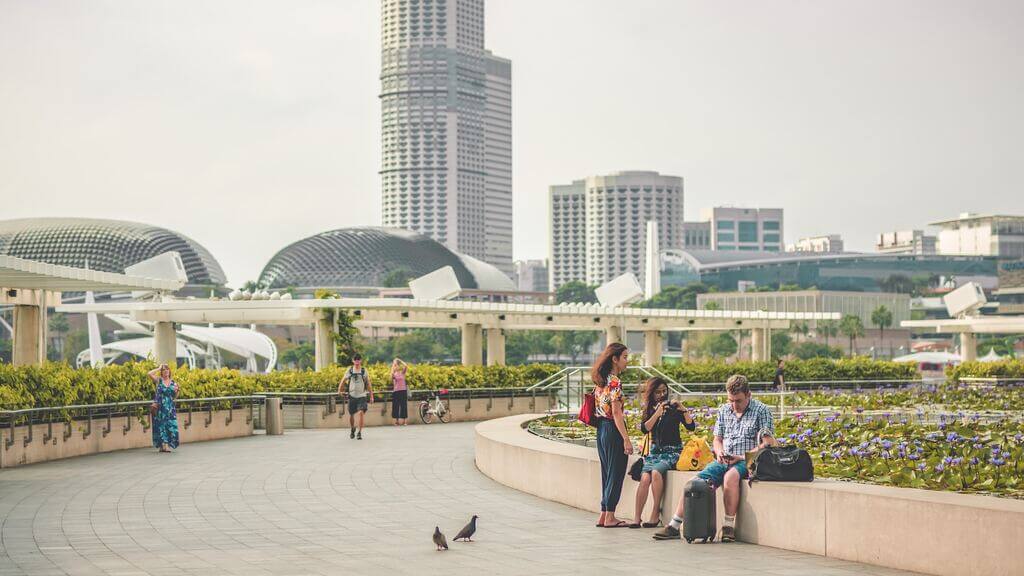The current state of the real estate market in Singapore
The Singapore real estate market analysis projects growth from SGD 62.46 billion ($46.91 billion) in 2024 to SGD 85.87 billion ($64.49 billion) by 2029 at a compound annual growth rate (CAGR) of 6.57%. This growth is fueled by increased demand for affordable housing projects, logistics, and industrial real estate sector expansion. Moreover, the third quarter of 2024 marked a significant rebound in Singapore’s real estate investments, recording the first increase in nearly two years. Investment volumes soared by 75%, reaching SGD 6.9 billion ($5.18 billion), primarily driven by robust Government Land Sales (GLS). GLS was pivotal in boosting investment sales, contributing SGD 10.46 billion ($7.85 billion) in 2023—a 40% increase compared to the previous year. These transactions accounted for 38% of total real estate investments in the Singapore real estate market, doubling the 19.2% share recorded in 2022.
The Singapore real estate market analysis shows robust growth, propelled by the increasing adoption of remote work, the rise of online property platforms, and a focus on smart city and sustainable development projects. Singapore real estate market analysis highlights the impact of remote work in driving demand for properties that blend convenience and comfort while integrating smart home features and digital platforms, which has reshaped property transactions. The competitive market landscape has prompted real estate firms in Singapore to prioritize innovation and strategic alliances to maintain a competitive edge. Additionally, the scarcity of land and government regulations are pivotal in shaping the housing market.
Residential property market trends
The Singapore residential property analysis showed resilience despite global slowdowns. Property prices of the Singapore housing market rose for the 12th consecutive quarter, with housing sales reaching high in 2023 due to eased supply shortages and buyers’ resistance to rising interest rates. Moreover, housing prices increased by 2.7%, reflecting a 0.5% year-on-year growth. Singapore’s housing market has remained robust post-pandemic, with private home prices rising 10.6% in 2021 and 8.6% in 2022.
The residential property price trend in Singapore remained competitive in 2024. Public housing managed by the Housing & Development Board (HDB) has resale prices ranging from SGD 378,000 ($283,878) for a 3-room flat in Jurong West to SGD 989,900 ($743,415) for a 5-room flat in Bishan. Singapore’s property market for HDB flats tends to be pricier in central or well-connected areas like Bishan than in outer regions like Jurong West. Moreover, the Singapore real estate market analysis shows that the average price for landed properties was SGD 5.37 million ($4.03 million), with prices highest in the Core Central Region (CCR) at SGD 9.84 million ($7.39 million) and lowest in the Outside Central Region (OCR) at SGD 4.45 million ($3.34 million).
Furthermore, condominiums impact the Singapore residential property analysis, with the condo price trend in Singapore reaching an average price of SGD 1.95 million ($1.46 million), with prices highest in the Core Central Region (CCR) at SGD 9.84 million ($7.39 million) and lowest in the Outside Central Region (OCR) at SGD 4.45 million ($3.34 million). The condo price trend in Singapore per square foot follows a similar trend, ranging from SGD 1,631.63 ($1,225) in the OCR to SGD 2,202.76 ($1,654) in the CCR. The Singapore rental market manifests a lucrative sector, with a typical short-term rental booked for 197 nights annually, a 54% median occupancy rate, and an average daily rate of SGD 199 ($149), leading to an average annual rental income of SGD 37,000 ($27,787) in 2023. With a 54% occupancy rate, the market is favorable for Airbnb’s profitability.
Singapore’s commercial real estate market
In commercial real estate, investments surged by 14% year-on-year to SGD 2.95 billion ($2.22 billion) in Q1 2024, driven by retail and hospitality sectors. Retail vacancy rates remain low, with rising capital values for malls, while the hospitality sector benefits from a tourism rebound. The Singapore real estate market analysis shows the market’s value is expected to reach SGD 667.25 billion ($501.1 billion) by the end of 2024. The property price trend in Singapore for commercial properties varies between SGD 2 million ($1.5 million) and SGD 30 million ($22.53 million), depending on location and size. In contrast, the Singapore property market trends for rental commercial spaces range from SGD 4,000 ($3,004) to SGD 13,000 ($9,763).
Real estate investment opportunities and risks
The Singapore real estate market outlook shows opportunities for property investors. However, buying property in Singapore for foreigners comes with risks. Weighing between the opportunities and risks allows them to conduct Singapore real estate market analysis and make sound investment decisions. Below are the Singapore real estate investment opportunities for property investors:
- Affordable housing: The government’s affordable housing initiatives create opportunities for investors through land sales programs and ensure stable long-term demand in the Singapore real estate market, making public housing development a secure investment option.
- Industrial and logistics real estate: The Singapore real estate market analysis indicates Singapore’s role as a key logistics hub in Southeast Asia drives demand for industrial real estate, including warehouses and logistics parks. The growth of e-commerce and global supply chains ensures steady cash flows and long-term returns on investment in Singapore real estate.
- Commercial real estate: The Singapore real estate market analysis depicts shifting workplace trends, including remote work and decentralized offices, boosting demand for suburban spaces and co-working environments.
- Luxury properties: Despite cooling measures like higher stamp duties for foreign buyers, demand for luxury residential properties remains a robust investment in Singapore real estate among high-net-worth individuals and affluent locals.
- Hospitality sector: Singapore real estate market analysis highlights the tourism industry rebounding post-pandemic; investments in hotels, serviced apartments, and resorts show strong potential. Government initiatives like the BOOST program and infrastructure projects are further fueling growth in the hospitality market, contributing to the Singapore real estate investment opportunities.
On the other hand, the Singapore real estate market analysis can also pinpoint the risks to foreign investors. Below is the Singapore real estate market outlook for the risks foreign buyers need to consider:
- Market volatility and economic sensitivity: The Singapore real estate market analysis highlights the market’s vulnerability to global economic shifts, rising interest rates, and inflation, which can dampen demand, especially for high-end properties reliant on foreign buyers.
- Government regulations: Strict government policies, such as higher stamp duties and loan-to-value restrictions, aim to stabilize the market but can also limit investor profitability, particularly in the luxury and speculative segments.
- Rising land costs: Limited land availability drives up prices, making development costly and competitive, especially in prime areas. This reduces profit margins for residential and commercial projects.
- Foreign investment risks: Singapore real estate market analysis further focuses on geopolitical tensions, regulatory changes, and global market uncertainty that can reduce foreign investment, destabilize high-end residential markets, and lower property values.
- Over-supply: Remote and hybrid work trends risk oversupplying office and retail spaces, potentially reducing rental yields and market stability in these sectors.
- Currency fluctuations: Exchange rate volatility affects foreign investors’ returns, introducing unpredictability to their investment in Singapore real estate.
- Environmental and climate risks: The Singapore real estate market analysis shows that rising sea levels and extreme weather threaten coastal developments. At the same time, non-compliance with sustainability standards can impact long-term property values and returns.
What are the key market drivers?
The real estate trends in Singapore are ever-changing due to many key factors that shape the market. Singapore real estate market analysis involves the understanding of each market driver indicated below:
- Customer preferences: Many prioritize properties with convenient access to transportation, shopping, schools, and modern amenities when buying property in Singapore for foreigners. Smart home technologies and sustainable features are increasingly in demand, reflecting a shift toward eco-friendly and comfortable living.
- Market trends: Mixed-use developments, combining residential, commercial, and retail spaces, are occurring in real estate trends in Singapore due to their convenience and community-focused designs. Additionally, co-living spaces are rising, offering affordable, flexible housing with shared amenities, indicating high demand in the Singapore real estate market analysis, especially to young professionals and expats seeking cost-effective, social living arrangements.
- Unique local factors: Singapore’s limited land supply has led to high property prices, prompting government regulations like stamp duties and cooling measures to stabilize the market and ensure affordability.
- Macroeconomic influences: Sinagpore’s stable economy, strategic location, and focus on urban development attract foreign investors, as shown in the Singapore real estate market analysis, reinforcing its position as a regional business and residential hub.
The future outlook for Singapore’s real estate market
The 2025 Singapore real estate market analysis is poised for growth, driven by external and local factors. The US presidential election’s influence on global inflation and interest rates under the new administration creates favorable borrowing conditions, boosting new home and resale transactions.
Locally, the property market forecast in Singapore is influenced by a stable economy, low unemployment rate, and rising household incomes, enhancing affordability and buyer confidence. A robust pipeline of 24 private residential projects, mainly in suburban and city-fringe areas, caters to HDB upgraders and first-time buyers, with private home prices expected to rise moderately by 2%-4%. Meanwhile, the Singapore real estate market analysis shows the resale market faces robust demand but limited supply, with private home completions projected to drop by 41.3%, likely driving resale prices up by 4%-7%.
Strong economic fundamentals, easing mortgage rates, and competitive opportunities make the property market forecast in Singapore for 2025 promising, though buyers and investors must act decisively to navigate the dynamic market.
Valuable insights and practical advice, distilled from years of expertise and real-world experience.


Frequently Asked Questions (FAQs)
What are the current trends in Singapore’s residential real estate market?
Current trends in Singapore’s residential real estate market include growing demand for mixed-use developments, increased interest in sustainable and smart home features, and the rising popularity of co-living spaces among young professionals and expats.
Why are property prices in Singapore rising?
Property prices in Singapore are rising due to limited land supply, strong demand driven by both local and foreign buyers, robust economic growth, and government policies that support long-term market stability.
Is now a good time to invest in Singapore’s real estate market?
Yes, now is a good time to invest in Singapore’s real estate market due to its strong economic fundamentals, stable demand, and government support. However, investors should consider factors like rising interest rates and market volatility.
Which areas in Singapore offer the best real estate investment opportunities?
The best real estate investment opportunities in Singapore are found in the Core Central Region (CCR), the Rest of Central Region (RCR), and areas with strong growth potential like the Greater Southern Waterfront and Jurong East, which are expected to benefit from ongoing development and infrastructure projects.
Is Singapore real estate still worth investing in?
Yes, Singapore’s real estate market is still worth investing in due to its stable economy, strong demand, limited land supply, and the government’s continued efforts in urban development.
What is the outlook for the Singapore property market in 2025 and beyond?
The outlook for the Singapore property market trends in 2025 and beyond remains positive. It is driven by ongoing urban development, strong demand from locals and foreigners, and government policies to maintain market stability and affordability.
How can investors analyze the Singapore property market?
Investors can analyze the Singapore property market by examining key factors such as economic trends, government policies, supply and demand dynamics, property price movements, and market segments with strong growth potential, such as mixed-use developments and areas undergoing infrastructure development.
How is the property rental market in Singapore performing?
The Singapore rental market is performing well, with strong demand driven by limited supply, high expat demand, and increasing interest in the private and public Singapore housing market. This results in rising rental prices in prime areas and near transport hubs.



